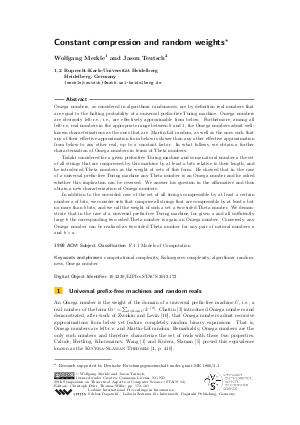Constant compression and random weights
Authors Wolfgang Merkle, Jason Teutsch
-
Part of:
Volume:
29th International Symposium on Theoretical Aspects of Computer Science (STACS 2012)
Part of: Series: Leibniz International Proceedings in Informatics (LIPIcs)
Part of: Conference: Symposium on Theoretical Aspects of Computer Science (STACS) - License:
 Creative Commons Attribution-NonCommercial-NoDerivs 3.0 Unported license
Creative Commons Attribution-NonCommercial-NoDerivs 3.0 Unported license
- Publication Date: 2012-02-24
File

PDF
LIPIcs.STACS.2012.172.pdf
- Filesize: 472 kB
- 10 pages
Document Identifiers
Subject Classification
Keywords
- computational complexity
- Kolmogorov complexity
- algorithmic randomness
- Omega number
Metrics
- Access Statistics
-
Total Accesses (updated on a weekly basis)
0Document
0Metadata
Abstract
Omega numbers, as considered in algorithmic randomness, are by definition real numbers that are equal to the halting probability of a universal prefix-free Turing machine. Omega numbers are obviously left-r.e., i.e., are effectively approximable from below. Furthermore, among all left-r.e. real numbers in the appropriate range between 0 and 1, the Omega numbers admit well-known characterizations as the ones that are Martin-Löf random, as well as the ones such that any of their effective approximation from below is slower than any other effective approximation from below to any other real, up to a constant factor. In what follows, we obtain a further characterization of Omega numbers in terms of Theta numbers. Tadaki considered for a given prefix-free Turing machine and some natural number a the set of all strings that are compressed by this machine by at least a bits relative to their length, and he introduced Theta numbers as the weight of sets of this form. He showed that in the case of a universal prefix-free Turing machine any Theta number is an Omega number and he asked whether this implication can be reversed. We answer his question in the affirmative and thus obtain a new characterization of Omega numbers. In addition to the one-sided case of the set of all strings compressible by at least a certain number a of bits, we consider sets that comprise all strings that are compressible by at least a but no more than b bits, and we call the weight of such a set a two-sided Theta number. We demonstrate that in the case of a universal prefix-free Turing machine, for given a and all sufficiently large b the corresponding two-sided Theta number is again an Omega number. Conversely, any Omega number can be realized as two-sided Theta number for any pair of natural numbers a and b>a.
Cite As Get BibTex
Wolfgang Merkle and Jason Teutsch. Constant compression and random weights. In 29th International Symposium on Theoretical Aspects of Computer Science (STACS 2012). Leibniz International Proceedings in Informatics (LIPIcs), Volume 14, pp. 172-181, Schloss Dagstuhl – Leibniz-Zentrum für Informatik (2012)
https://doi.org/10.4230/LIPIcs.STACS.2012.172
BibTex
@InProceedings{merkle_et_al:LIPIcs.STACS.2012.172,
author = {Merkle, Wolfgang and Teutsch, Jason},
title = {{Constant compression and random weights}},
booktitle = {29th International Symposium on Theoretical Aspects of Computer Science (STACS 2012)},
pages = {172--181},
series = {Leibniz International Proceedings in Informatics (LIPIcs)},
ISBN = {978-3-939897-35-4},
ISSN = {1868-8969},
year = {2012},
volume = {14},
editor = {D\"{u}rr, Christoph and Wilke, Thomas},
publisher = {Schloss Dagstuhl -- Leibniz-Zentrum f{\"u}r Informatik},
address = {Dagstuhl, Germany},
URL = {https://drops.dagstuhl.de/entities/document/10.4230/LIPIcs.STACS.2012.172},
URN = {urn:nbn:de:0030-drops-34351},
doi = {10.4230/LIPIcs.STACS.2012.172},
annote = {Keywords: computational complexity, Kolmogorov complexity, algorithmic randomness, Omega number}
}
